Negosiasi Makna dalam Pemerolehan Bahasa Indonesia sebagai Bahasa Kedua: Studi Kasus Penutur Asal Taiwan
https://doi.org/10.30605/onoma.v11i1.5109
Keywords:
pemerolehan bahasa kedua, negosiasi makna, penutur Taiwan, Bahasa IndonesiaAbstract
Tujuan penelitian ini adalah untuk mendeskripsikan dan menganalisis bentuk serta penggunaan negosiasi makna dalam pemerolehan bahasa Indonesia sebagai bahasa kedua oleh penutur asal Taiwan. Penelitian ini menggunakan metode kualitatif deskriptif, dengan data yang dikumpulkan melalui transkrip video percakapan antara penutur Taiwan dan penutur asli Indonesia. Hasil analisis menunjukkan enam bentuk negosiasi makna, yaitu klarifikasi, konfirmasi ulang, umpan balik, alih kode (code switching), pengulangan, dan penambahan informasi. Bentuk klarifikasi dan alih kode ditemukan sebagai strategi yang paling dominan digunakan. Proses negosiasi makna tidak hanya membantu meningkatkan pemahaman linguistik, tetapi juga memfasilitasi proses akuisisi bahasa melalui interaksi yang bermakna. Penelitian ini menyimpulkan bahwa negosiasi makna merupakan strategi esensial dalam pemerolehan bahasa kedua. Sehingga hal ini mampu memberikan wawasan penting bagi pembelajar dan pengajar bahasa, khususnya dalam konteks pembelajaran lintas budaya.
Downloads
References
Awaliyah, M. (2023). Pembelajaran BIPA (Bahasa Indonesia Bagi Penutur Asing): Studi Kasus Kesalahan Berbahasa pada Pemelajar Tiongkok di Universitas Negeri Yogyakarta. EDUPEDIKA: Jurnal Studi Pendidikan dan Pembelajaran, 2(2), 39-49.
Budiawan, R. Y. S., & Rukayati, R. (2018). Kesalahan Bahasa dalam Praktik Berbicara Pemelajaran Bahasa Indonesia bagi Penutur Asing (BIPA) di Universitas PGRI Semarang Tahun 2018. KREDO : Jurnal Ilmiah Bahasa Dan Sastra, 2(1), 88-97 DOI: https://doi.org/10.24176/kredo.v2i1.2428
Creswell, J. W. (2014). Research design: Qualitative, Quantitative, and Mixed Methods Approaches (4th ed.). Sage Publications.
Darmawansah, D. (2020). Teaching Indonesian as a Foreign Language Through Small Private Online Course (SPOC): Investigating Learners' Multidimensional Anxiety in Online Learning. Epistema, 1(2), 69-77. DOI: https://doi.org/10.21831/ep.v1i2.34995
Ellis, R. (1989). Understanding Second Language Acquisition (Vol. 31). Oxford: Oxford University Press.
Foster, P., & Ohta, A. S. (2005). Negotiation for Meaning and Peer Assistance in Second Language Classrooms. Applied linguistics, 26(3), 402-430. DOI: https://doi.org/10.1093/applin/ami014
Handoko, M. P., Fahmi, R. N., Kurniawan, F. Y., Artating, H., & Sinaga, M. S. (2019). Potensi Pengembangan Bahasa Indonesia Menjadi Bahasa Internasional. Jurnal Bahasa Indonesia bagi Penutur Asing (JBIPA), 1(1), 22-29. DOI: https://doi.org/10.26499/jbipa.v1i1.1693
Hofstede, G. (1984). Culture's Consequences: International Differences in Work-Related Values. Sage Publications.
Krashen, S. (1981). Second Language Acquisition. Second Language Learning, 3(7), 19-39.
Long, M. H. (1980). Input, interaction, and Second Language Acquisition. University of California, Los Angeles.
Mahamod, Z. (2021). Sikap dan motivasi murid Iban dalam mempelajari Bahasa Melayu sebagai bahasa kedua. Jurnal Pendidikan Bahasa Melayu, 1(1), 13-25.
Muzakki, A., Pratama, G. C. W., A. Muh Rezki Syahaf, & Muzaki, H. . (2024). Perbedaan Budaya Keseharian Taiwan dan Indonesia. Journal of Language Literature and Arts, 4(8), 898–906. https://doi.org/10.17977/um064v4i82024p898-906 DOI: https://doi.org/10.17977/um064v4i82024p898-906
Rosiyana, R. (2020). Pengajaran Bahasa dan Pemerolehan Bahasa Kedua dalam Pembelajaran BIPA (Bahasa Indonesia Penutur Asing). Jurnal Ilmiah KORPUS, 4(3), 374-382. DOI: https://doi.org/10.33369/jik.v4i3.13839
Samani, E., Nordin, N., Mukundan, J., & Samad, A. (2015). Patterns of Negotiation of Meaning in English as Second Language Learners' Interactions. Advances in Language and Literary Studies, 6(1), 16-25. DOI: https://doi.org/10.7575/aiac.alls.v.6n.1p.16
Tiawati, R. L., Rahmat, W., Kemal, E., & Chen, W. (2022). The Importance of Guidance in Understanding Cultural Discourse in Thinking and Speaking for Foreign Students in BIPA Program. Journal of Pragmatics and Discourse Research, 2(1), 39-47. DOI: https://doi.org/10.51817/jpdr.v2i1.203
Ummah, M. N., Nurhadi, N., Roekhan, R., & Wahyu P, G. C. (2025). Strategi Komunikasi dalam Mengatasi Ketidaktepatan Berbahasa Lisan pada Mahasiswa Penutur Asing: Studi Kasus Mahasiswa Uganda yang Belajar Bahasa Indonesia. Jurnal Onoma: Pendidikan, Bahasa, Dan Sastra, 11(1), 232-244. https://doi.org/10.30605/onoma.v11i1.5017 DOI: https://doi.org/10.30605/onoma.v11i1.5017
Downloads
Published
How to Cite
License
In submitting the manuscript to the journal, the authors certify that:
- They are authorized by their co-authors to enter into these arrangements.
- The work described has not been formally published before, except in the form of an abstract or as part of a published lecture, review, thesis, or overlay journal.
- That it is not under consideration for publication elsewhere,
- That its publication has been approved by all the author(s) and by the responsible authorities – tacitly or explicitly – of the institutes where the work has been carried out.
- They secure the right to reproduce any material that has already been published or copyrighted elsewhere.
- They agree to the following license and copyright agreement.
License and Copyright Agreement
Authors who publish with Onoma Journal: Education, Languages??, and Literature agree to the following terms:
- Authors retain copyright and grant the journal right of first publication with the work simultaneously licensed under Creative Commons Attribution License (CC BY 4.0) that allows others to share the work with an acknowledgment of the work's authorship and initial publication in this journal.
- Authors are able to enter into separate, additional contractual arrangements for the non-exclusive distribution of the journal's published version of the work (e.g., post it to an institutional repository or publish it in a book), with an acknowledgment of its initial publication in this journal.
- Authors are permitted and encouraged to post their work online (e.g., in institutional repositories or on their website) prior to and during the submission process, as it can lead to productive exchanges, as well as earlier and greater citation of published work.

















